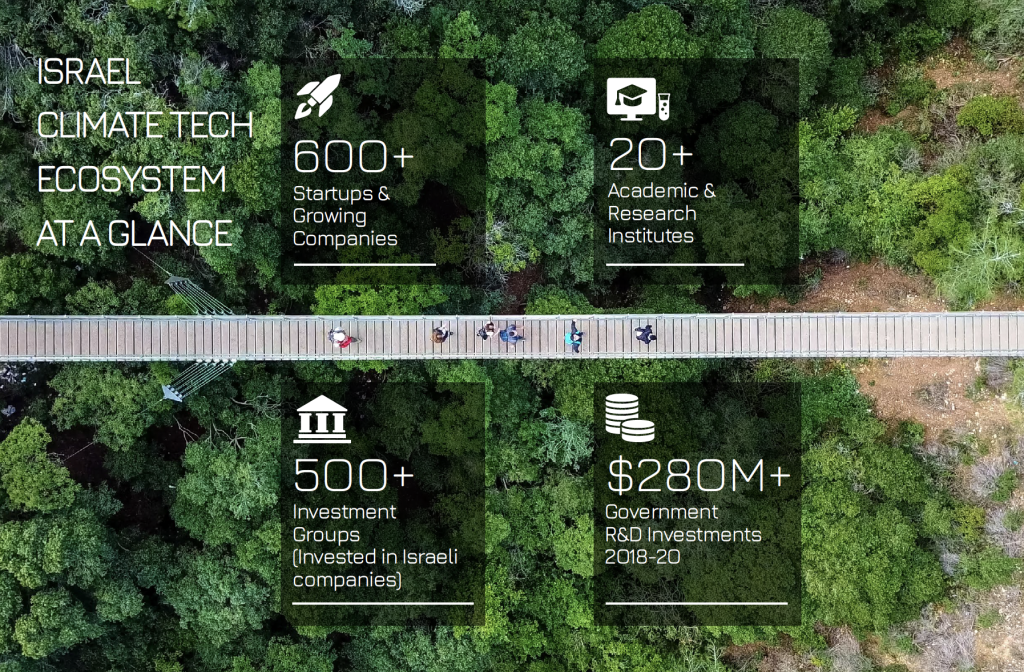Technological innovations play a crucial role in the global challenge to mitigate and adapt to climate change. Israel is renowned as a global leader of technological innovation and this report sets out to examine, for the first time, Israel’s state of climate tech and the potential of its “problem solving” entrepreneurs to provide solutions for the world’s greatest challenge.
Israeli companies developing technologies that contribute to decarbonization, mitigation, and adaptation were mapped according to the PLANETech Climate Challenge Map. 637 companies were identified as climate tech startup and growth companies, the majority of which are less than 7 years old. Threequarters of the startups younger than 7 years have less than 10 employees, reflecting the long development period and late onset of growth for climate tech companies, most of which have hardware at the core of their innovation. The number of newly established climate tech related startups surged in 2014 and, since then, their share of all newly-founded Israeli startups has increased each year, reaching 9% in 2020. Challenge areas with the largest number of companies, are Climate Smart Agriculture, Clean Energy Systems,and Sustainable Mobility & Transport, and are comprised of both mature and startup companies. Domains that display the most rapid growth of startups in the last three years are Alternative Proteins and Green Construction while emerging domains showing a significant increase in the number of new startups are Transparent & Agile Supply Chains, Novel Materials, Circularity, and Food Loss & Waste. The climate tech startups have received investments from over 560 investment groups, of which two-thirds are headquartered abroad. Between 2018- 2020, total investments in climate tech reached 2.97 billion USD. Less than 1% of investments were from dedicated late-stage funds. Although attracting a significant amount of capital and investment groups, the climate tech ecosystem suffers from lack of the necessary diversity in both type and focus of such investment groups. The Israeli government provides significant complementary support during the various stages of product development. This support totaled 280 million USD between 2018-2020.
Israel’s global dominance in specific climate technologies was examined with the SparkBeyond© AI-powered platform. Israel was shown to hold absolute global leadership in the areas of cultivated meat, irrigation systems, and water desalination. When normalizing the results by GDP spending on R&D, Israel also holds a position of global leadership in the entire alternative proteins domain as well as in precision agriculture, sustainable mobility, and solar power.
However, a comparison between the success rate for Israeli Green Deal submissions with that for all Horizon programs, indicates that Israel is far from realizing its global potential in Europe’s largest climate funding program.
Despite demonstrating a growing ecosystem, Israel has yet to exhaust its potential for innovation, commercialization and scaling up of climate tech solutions.
A survey conducted among Israeli climate tech companies revealed that the main challenges to growth are access to capital, regulatory hurdles, and the difficulties of market scale up opportunities. The report concludes with several recommendations for overcoming these challenges and further facilitating the continued growth of climate tech companies in Israel. These include pathways to increase access to private and public capital, increasing commitment of government and regulators, engaging the varied stakeholders in the ecosystem, and showing leadership by adopting an overall vision for a carbon-neutral Israel. A strong governmental mindset and leadership are instrumental in creating strong momentum and transforming Israel into a global leader in climate tech innovation.

